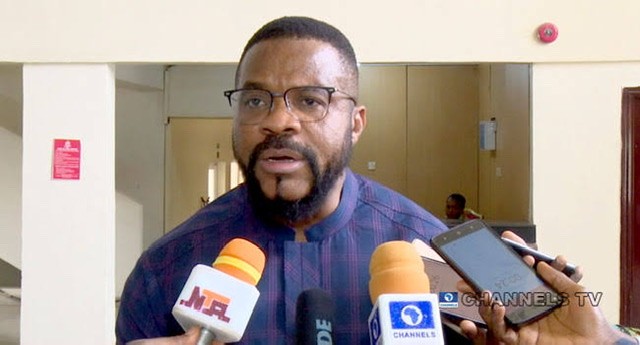The Federal Government is targeting to increase the share of Nigeria’s trade in Gross Domestic Product to about 50 per cent by 2023.
The Acting Chief Trade Negotiator/Director General, Nigerian Office for Trade Negotiations, Victor Liman said this on Tuesday in Abuja during the launch of Nigeria’s trade policy journal.
Advertisement
The journal is titled, “A Nigerian policy roadmap: Perspectives and Insights.”
The document lays out Nigeria’s ambition and aggressive plan to drive rapid trade growth and benefits.
Liman said while the plan of the document is to boost trade in GDP to 50 per cent, it would also enable the government raise the employment share in trade-related industries to 28 per cent by 2023.
While the document did not provide the monetary value of the quantum of trade being targeted in the nation’s GDP, an analysis by THE WHISTLER showed that this is expected to hit N75.24trn by 2023.
Advertisement
The N75.24trn is based on the nominal GDP projections of N150.49trn approved by the Federal Government in the Medium Term Expenditure Framework.
Based on the N150.49trn, it therefore implies that the government would be targeting a total trade of N75.24trn based on projection to have about 50 per cent of traded goods and services in GDP.
Liman said the trade policy document is rooted in the country’s quest to tap into the rare opportunity presented by the Coronavirus pandemic to stimulate development in various sectors of the economy.
The sectors are manufacturing;
health; processed and semi-processed exports; services trade; innovation, research and development; science and technology; e-Commerce; teleworking; and telemedicine among others.
Considering the prevailing economic situation, the NOTN Boss explained that the priority focus would be to ensure sustainable growth in goods and services exports while respecting environmental concerns.
Advertisement
He highlighted other areas of priority under the plan to include rapid development of Nigeria’s digital economy; formalising Nigeria’s large informal economy; and further developing Micro, Small and Medium Enterprises.
He said, “We are all aware that COVID-19 has impacted all sectors and human interaction in Nigeria in the short, medium and long run.
“Consequently, we are experiencing
trade deficits; loss of businesses and investments; healthcare systems overstretched, welfare, tourism and aviation impacted;
free trade under threat; borders closed; supply chains disrupted; aviation suspended; changes to policies on trade, healthcare, budgets, ICT, oil and gas.
“Hence, there is the need for a Trade Policy Roadmap to sustain the economy, recover losses and sustainably grow the economy; through a broad multi-sectoral and coordinated response by Nigeria domestically and regionally.
“This Policy was drawn up as a preparatory work to be a reference source for further engagement with critical, relevant and strategic stakeholders.”
He said the policy would assist NOTN to effectively coordinate and manage Nigerias trade policy and other sectoral policies.
Advertisement
Liman said the Trade Policy Roadmap contains proactive strategies and responsive policy measures to address current and future challenges.
He noted that based on the document, the various policy mixtures on COVID-19 would help to address economic recovery, regional cooperation, trade facilitation, and removal of trade barriers.
In the area of trade, foreign policy and National Security, he said this would be linked with economic integration at continental and ECOWAS level.
For trade competitiveness and rule-based safeguards, he said the objectives would be on economic diversification, and more market access for Nigerian products.
In the area of trade and related policies, Liman said the target would be to improve business environment, industrial policy, technology and broaden regulatory policies.
For Trade in Services, he said the plan would ensure more service-oriented economy, increase services sector contribution to GDP, whole ensuring trade liberalisation under ECOWAS and World Trade Organisation.
He expressed optimism that if effectively implemented, the document would scale up manufacturing and services for domestic market and exports; thereby making Nigeria one of the top 15 largest economies by 2025.
He said the Trade Policy recognised the important link between trade policy and industrial policy as it is set within the context of Nigeria’s Industrial Revolution Plan and would be implemented through Public Private Partnership.



